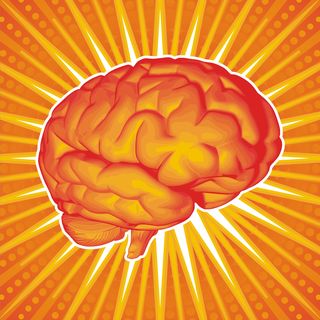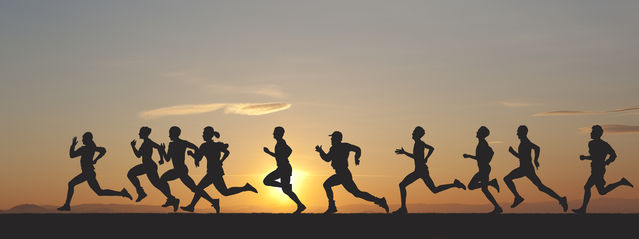Health
Physical Activity Boosts Brain Power and Cerebral Capacity
Physical activity improves cognitive function and academic performance.
Posted June 27, 2016

I’ve dedicated my adult life to researching and writing about the benefits of physical activity. In recent years, there’s been a groundswell of research showing that in addition to physical health benefits, exercise also improves brain structure, functional connectivity, and cognition at every stage of the human lifespan.
Today, a diverse team of worldwide experts published a 'Consensus Statement' agreeing that physical activity boosts brain power, academic performance, and a broad spectrum of life skills for kids and young adults.
I know from first hand experience that physical activity can transform your life, especially during adolescence. As I describe on p. 10 of The Athlete's Way: Sweat and the Biology of Bliss,
When I started running in June 1983 my body was a toxic waste dump. I could run for about twelve minutes maximum. I was a weak, washed-out, drug-abusing teenager. From June to September, I went from being a cynical, messed-up kid to being an enthusiastic, ambitious go-getter. More impressive to me than having a new washboard stomach and strong, seventeen-year-old biceps was that my brain had been transformed. I was on fire. I could have been anyone I wanted. I felt unstoppable.
I walked with a new kind of peppy step and moved with intent . . . I had free will and the power to create a new reality—to do what I wanted with my life. My learned helplessness and self-destruction waned; I had developed a sense of dignity. I went from being a straight-C student in high school to blazing through college in three years. I had velocity.
Physical Activity Boosts Brain Power, Academic Prowess, and Self-Esteem

In April 2016, an international team of researchers—from a wide range of academic disciplines—gathered in Denmark to reach an evidence-based consensus about the physiological, cerebral, and social benefits of physical activity in children and youth between 6 and 18 years of age.
“The Copenhagen Consensus Conference 2016: Children, Youth, and Physical Activity in Schools and During Leisure Time,” was published online today in the British Journal of Sports Medicine.
This consensus was obtained through a process that began with presentation of state-of-the-art findings in various domains followed by plenary and group discussions. Together, the international team reached agreement on the 21-item consensus statement.
The consensus statement describes physical activity as “an overarching term that consists of many structured and unstructured forms within school and out-of-school-time contexts, including organized sport, physical education, outdoor recreation, motor skill development programs, recess, and active transportation such as biking and walking.”
The June 2016 consensus statement includes 21 separate statements on the four themes of: fitness and health; intellectual performance; engagement, motivation and well-being; and social inclusion. The consensus spans structured and unstructured forms of physical activity for 6 to 18 year old students during school and leisure time.
According to the consensus statement, the positive effects of exercise go beyond physical health and cerebral capacity. Regular physical activity also helps to develop a wide range of life skills by improving self-esteem, motivation, confidence, and overall psychological well-being.
The consensus statement reports that the daily process of being physically active promotes social inclusion with peers and fosters healthier relationships with classmates from different backgrounds, ethnicities, sexual orientations, skill levels, and athletic abilities.
Among other findings, the consensus statement offers these bullet points:
- Physical activity and cardiorespiratory fitness are beneficial to brain structure, brain function, and cognition in children and youth.
- Physical activity before, during, and after school promotes scholastic performance in children and youth.
- A single session of moderate physical activity has an acute benefit to brain function, cognition, and scholastic performance in children and youth.
- Time taken away from lessons in favor of physical activity does not come at the cost of getting good grades.
- Mastery of fundamental movement skills is beneficial to cognition and scholastic performance in children and youth.
- Social inclusion can be promoted by providing equal access to opportunities within physical activity and sports settings regardless of children and young people’s social, cultural, physical, and demographic characteristics.
- Physical activity-based positive youth development programs that have an intentional curriculum and deliberate training are effective at promoting life skills (eg, interpersonal, self-regulation skills) and core values (e.g., respect and social responsibility) in children and youth.
Regarding the physiological benefits of exercise, the consensus states that cardiorespiratory and muscular fitness "are strong predictors" of someone's risk for developing heart disease and type 2 diabetes later in life. Regular, vigorous aerobic exercise helps to keep these risk factors in check. Frequent, moderate intensity and, to a lesser extent, low-intensity exercise helps to improve heart health and metabolism.
Conclusions: Activity-Friendly Spaces Are Paramount for Well-Being
Hopefully, these findings will be a call-to-action for parents, policymakers, and teachers to ensure that physical activity is an integral part of every child’s daily life. The research also serves as a reminder that providing safe and protected public spaces—such as bike lanes, parks, and playgrounds—is of paramount importance for facilitating egalitarian access to physical activity for children and youth from all walks of life.
To read more on this topic, check out my Psychology Today blog posts,
- "Why Is Physical Activity So Good For Your Brain?"
- "Physical Activity Boosts Brain Power"
- "Neuroscience Pinpoints Unique Way Exercise Fights Depression"
- "Physical Activity Is the No. 1 Way to Keep Your Brain Young"
- "Physical Activity Improves Cognitive Function"
- "More Proof That Aerobic Exercise Can Make Your Brain Bigger"
- "Better Brain Health Is Possible Without Exercise Fanaticism"
- "Superfluidity: Fluid Intelligence Goes Beyond Brain Size"
- "Aerobic Exercise Stimulates Neurogenesis (Birth of Neurons)"
© 2016 Christopher Bergland. All rights reserved.
Follow me on Twitter @ckbergland for updates on The Athlete’s Way blog posts.
The Athlete's Way ® is a registered trademark of Christopher Bergland.




